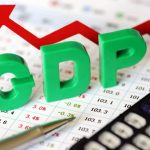ISLAMABAD: Governor State Bank of Pakistan (SBP) Dr Reza Baqir has reportedly projected GDP growth between -2 per cent to -3 per cent if lockdown continues for 60 days, well informed sources told Business Recorder.
He shared his projections for Q4 of current financial year and the projections for FY 21 at a recent meeting held to discuss post Covid 19 effects on macroeconomic outlook. Prime Minister’s Advisor on Finance and Revenue, Dr. Hafeez Shaikh presided over the meeting.
Governor State Bank of Pakistan, Dr Reza Baqir informed the meeting that consumption has declined by 25-30 per cent (based on credit card data) and commercial activities have declined by 50 per cent as per Google analytics. According to Pakistan Business Council (PBC) there is almost 40-50 per cent decline in output. However, despite negative growth in industry and muted growth in services the real impact on GDP growth for FY 2020 will depend on the length of the lock down. SBP estimation are as follows ;(i) if lockdown continues for 30 days, GDP growth is estimated to be from -0.5 per cent to -1.5 per cent and ;(ii) if lockdown continues for 60 days, GDP growth is estimated to be from -2 per cent to -3 per cent.
Secretary, Ministry of Planning, Development and Special Initiatives, informed the meeting that due to availability of only first two quarters’ data, their estimation of GDP growth for FY 2020 is based on two different assumptions of hard lock down and partial lock down. He informed the meeting that real GDP growth for FY 2020 is projected to be around 1.5-1.8 per cent on the basis of estimated 2.2 per cent growth in agriculture, negative growth in industry and about 1.2-1.7 growth in services.
According to the initial estimates of the macroeconomic model adopted by PIDE, expected GDP growth for FY 2020 is to be around -0.3 per cent to -1.3 per cent. However, PIDE will come up with comprehensive result of the study soon.
Advisor to the Prime Minister on Institutional Reforms & Austerity, Dr. Ishrat Hussain questioned the assumption of 40 to 50 per cent decline in economic activities as food industry, pharmaceutical industry, fertilizer industry and some portion of textile industry are still working along with non significant impact on agriculture.
He stressed on the need for more reasonable and evidence based assessment.
Advisor to the Prime Minister on Commerce, Abdul Razak Dawood indicated lower exports in Q4. However, there was consensus that exports will remain between $ 22.5 to $ 23.5 billion, Imports $ 42 billion to $ 44 billion, remittances from $ 20 billion to $ 21 billion and thus Current Account Deficit (CAD) would be $ 4 billion. All external sector indicators are expected to be lower than the IMF forecast.
Secretary Finance, Kamran Baloch, apprised the meeting that the revenue collection is likely to decrease from the earlier estimate of Rs 4.8 trillion to Rs 3.9 trillion due to Covid-19; however, non-tax revenue is likely to rise from Rs 1.2 to Rs 1.5 trillion. Despite expected savings of about Rs 600 billion on expenditure side, fiscal deficit is likely to increase mainly because of revenue shortfall of more than Rs 1 trillion. Thus fiscal deficit for FY 2020 is expected to increase from pre-Covid estimation of 7.4 per cent to about 9.4 per cent.
Minister for Industries and Production, Hammad Azhar was of the view that to have an assessment and real GDP growth for FY 2020 a fortnightly meeting may be organized and high frequency data be obtained from relevant Ministries.
After detailed discussion, the participants decided that fortnightly meeting will be arranged to assess direction and outlook for economic activities.
Government organisations and relevant stakeholders must coordinate with each other in assessing/ estimating forecast for macroeconomic variables so that a realistic assessment may be made about economy.
PBS will coordinate with all stakeholders before estimating the GDP growth rate and while annualizing the GDP, will incorporate the Covid-19 impact in national accounts.
FBR will provide daily revenue collection with sectoral details, SPB to provide daily inflows of remittances and exports along with data on banking transactions, Ministry of Communication to provide daily vehicles movement on motorways/ highways, Power Division and Petroleum Divisions to provide sector-wise consumption data (electricity, gas and petroleum products).







